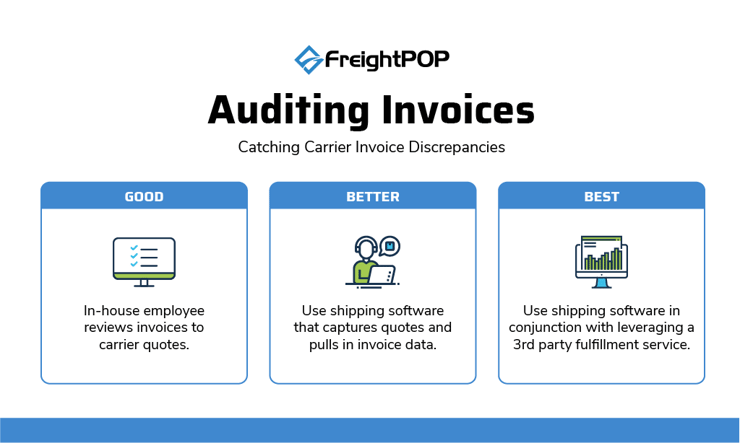Eliminate the Need for Freight Auditors
Freight is the second highest line item expense for most companies, while labor fills in the first slot. This explains why so much time and effort is...

"You need to conduct freight audits on every shipment. It's just bad business not to do some kind of auditing." FreightOptics' Brad McBride explains why audits are vital to your bottom line.

Brad McBride knows logistics inside and out. He founded and runs two leading logistics companies: FreightOptics and Zero Down Supply Chain Solutions. He collaborates with us on today's topic as he has a deep understanding of auditing processes and how carrier invoice discrepancies impact businesses.
On the freight side of things especially, Brad tells us there is still A LOT of manual data entry. For example, many customers still generate hard copy bills of ladings that they hand to the driver, who then gives it to the data entry clerk at the end of the day, who then manually types the information to process the shipment. It's a circumstance that is ripe for errors.
With freight or parcel, there are many data points you should check in auditing. Some of the more frequent errors include:
Errors can really impact profits. For example, Brad shares that recently, one of their FreightOptics customers didn't receive an earned discount from a parcel provider, which equated to over $80,000 in overcharges. FreightOptics immediately identified and provided the client with the data needed to recover these monies.
If you can't see it, then you're not managing it very well. If you aren't managing something well, this is when profits start leaking. Unfortunately, far too many businesses simply pay invoices and never know the extent to which they are hemorrhaging money.
Brad says you need to centralize digitally (something we've been covering quite a bit lately) and standardize your shipping data so that you're able to manage and allocate it for accounting purposes, cost reconciliation, or profit allocation. But if you don't have visibility, this is impossible to do.
CASE IN POINT: Brad notes how his team was reviewing one customer's UPS invoices, and despite high volumes, UPS was not applying incentives on a handful of parcel account codes. Since this customer has over 150 account numbers, this is something they would have missed without performing an automated audit.
Another example he shares involves a customer whose primary carrier was not applying their fuel surcharge correctly. The carrier didn’t apply the correct fuel surcharge percentage change that happened on a particular date according to their published fuel surcharge table. Brad notes the discrepancy was found using technology and automation.
Brad says accounting departments benefit a great deal when the invoice process transitions from manual to a fully automated audit and cost allocation process. Instead of manually allocating transportation expenses or reconciling different processes internally with other departments, an automated audit process cuts down significantly on accounting's workload, catches more errors, and pays for itself quickly. The ROI achieved by implementing this process is evident almost immediately!
There is a lot of value in having historical data on your shipping spend and carrier performance. The latter is incredible information to have ahead of carrier negotiations - and the sort of data that carriers often already have themselves. (See our post Accessing Reduced Freight and Insights Ahead of Carrier Negotiations.)
If a carrier consistently bills you incorrectly and your team has to spend time looking for errors and filing disputes, doing business with them is more expensive for you. You can use auditing data to guide you on which carriers to do business with and leverage data in carrier negotiations.
Below we present three scenarios (or levels) to auditing. The key difference being the cost, time, and effectiveness of each level. Whichever you choose to employ, commit to auditing. Brad adds:
"Whether you audit through TMS matching and have your staff handle the exceptions with carriers, or outsource to a third party such as a trusted partner like FreightOptics, you need to be conducting freight audits on every single shipment."

You can designate an employee to go through paper or emailed invoices to reference quotes and contracts to find errors. This process is better than nothing, but this is a complex and arduous task of going line item by line item on invoices to what was quoted and guaranteed as service. Additionally, keep in mind that there are so many different audit points to consider that it's truly impossible to do a thorough job manually—errors will slip through.
You'll also want to ensure the employee is versed in the types of errors to look for, carrier timeframes in which they must reconcile issues, and general nuances of the role that will make them as effective as they can be.
Better auditing means you are using shipping software (aka TMS) to collect invoice data digitally and process "TMS matching," whereby the system automatically finds carrier invoice discrepancies by cross comparing to the booking source.
This process will catch most errors, however, you still require an employee or a third party to take discrepancies to carriers and request refunds.
The best auditing possible means you leverage the power of your TMS to catch discrepancies, in conjunction with using auditing fulfillment services offered by your TMS solution or 3rd party companies like FeightOptics, that will manage the exceptions directly with the carriers on your behalf.
When you enable your TMS provider, or 3rd party, to access your data to perform auditing fulfillment, they can do two wonderful things:
1) Go after the money you are due on your behalf
2) Find further discrepancies that your system cannot catch
Brad explains that with an auditor such as FreightOptics, they investigate things like whether or not there really was a lift gate on an individual delivery to decide if such a charge is acceptable. FreightOptics, for example, takes the TMS-only approach to the next level – managing all exceptions and validating that lift gates are being charged accurately, as well as providing the TMS match and executing a full-blown re-rating of shipments.
Using an auditing service means you tap into experts who are well versed in finding carrier discrepancies and going after them to secure refunds. If you select a solid auditor, they will surpass any results you could get in-house or by having your in-house employee contact carriers for resolutions.
Our experience teaches us that most shippers are overcharged 15%+. If you ship a significant amount, that is a lot of money!
Let us set you up to identify and correct costly carrier invoice errors! Contact us to learn how.

Freight is the second highest line item expense for most companies, while labor fills in the first slot. This explains why so much time and effort is...

The transportation management system (TMS) marketplace is exploding. A report from Radiant Insights found that this sector will experience a more...
![[Ebook] 6 Ways To Save Money On Freight And Logistics](https://blog.freightpop.com/hubfs/%5BEbook%5D%206%20Ways%20To%20Save%20Money%20On%20Freight%20And%20Logistics.png)
[FREE EBOOK] We consult a panel of logistics experts to provide you with 6 critical ways you can save on your shipping and freight. Start saving now!